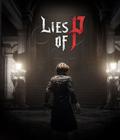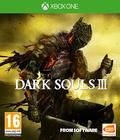One of Bandai Namco's big announcements at E3 earlier this year was Dark Souls III. Company reps showed off a demo, but it was strictly hands-off at the time. Last week, Namco invited media to an event in the San Francisco area and let us all go hands-on with the Dark Souls III E3 demo.
Watching a Dark Souls demo is a lot different than actually playing a Dark Souls demo. Rest assured that everyone at the event died — a lot. A Namco rep said that a straight run through the demo would take a good player around 10-15 minutes and an average player about 30 minutes. After more than an hour of playing, a majority of people at the event still hadn't mastered the demo. For most games, that would be a bad sign. For a Dark Souls game, that was a very good thing.
The demo started off on the Wall of Lodeleth, just as it did at E3. From there, I could look out over the castle and decide if I wanted to venture to the left or the right. Looking at the castle, the scope of the game became obvious as a Namco representative pointed out that everything that could be seen could be explored. The various levels in the castle, the towers, the doors, etc.; it was all fair game, assuming you could figure out how to get there and survive the trip.
Even though the demo level was a very small chunk of the game, the path through was by no means restricted. What the E3 demo didn't show were all the different side paths that could be taken. Playing through it in person, you also realize how many skeletons there are lying in wait, biding their time until an unsuspecting traveler walks past and then BAM!, they're attacking. Sneaky bastards.
I started my adventure with a character who carried a long sword. There was a second character whose default weapon was an ax, but in a game where speed offers a distinct advantage, I figured the sword was better. I decided to explore the area to the right. As I was later told, this was an alternate area with stronger enemies that were waiting to make my life hell. They did a good job of that.
First, there was what looked like a lanky dog. That was easy enough to dispatch, but I didn't account for the skeleton archer lying in wait on an alcove above. After three deaths, I figured out where he was hiding and took him out before he could attack. Revenge is sweet. Of course, then there were the two extra tall skeletal warriors, one with a great sword and the other who hit like an MLB slugger. I tried, but I eventually gave up and decided to go left at that initial fork. On the upside, I had managed to secure a great sword during those failed attempts, so I now had two weapons on hand.
There's no way to know what the final game will be like, but at least in the demo, dying only seems to mean losing souls, which could be reclaimed by finding your dead carcass. Weapons and items carried by the player were kept into the new life. This included the great sword as well as the fire bombs and throwing daggers I had found. The only thing that seemed to reset on death was the stock of health elixirs. Then again, if those didn't reset, progress would've been nigh impossible.
That left path was certainly easier going than the right, but it still offered plenty of challenge. The first area included a handful of worshippers who didn't attack unless you attacked them first. This may not seem like a big deal, except for the enemy in their midst who did attack. A mistimed counterattack that ends up hitting one of the worshippers means another fighter is joining the fray.
Venturing further, I found an interior area with two skeletal warriors and a bunch of breakable furniture. As I kept coming back to replay this area on death, I eventually found an alternate path that meant ending up in the same place but with a few more items in the inventory. That seemed to be the case for most of the alternate paths as the demo progressed. They would end up granting you extra items but weren't really shortcuts. You could open up gates that became shortcuts but only if you had already made it the long way around first.
An important element of combat is the Battle Arts system. You always have the standard attack and parry moves available when using a sword and shield. The Arts system adds bonuses to your attacks, though each use has a small drawback, so it's a risk/reward kind of thing. Do you use standard attacks and go with what's known? Or do you risk using the Arts, knowing that if you miss, you've just opened yourself up to a punishing counter? The AI never passes up on an opportunity to punish. "You died." Yes, yes I did, again and again.
Using the regular sword, the Arts attack put my character into a stance from which he could launch a more powerful blow. It required timing the attack but wasn't that much different from a regular attack. Where the Arts really became useful was with the great sword. By itself, the great sword was powerful but so bloody slow. The Arts allowed for a rush that could break an enemy's block or an attack that cut low to high, launching an enemy into the air. To be honest, it looked like a golf swing of death. Due to speed, I couldn't really use the great sword's Arts attack in a crowd, but when going one-on-one, it was glorious.
Continuing the adventure through the castle, I stumbled upon an open courtyard with a dragon perched on the tower. There was little warning that he was alive (there was a dead dragon carcass earlier in the level), so when the fire started blasting out, I believe my exact words were, "Holy s**t, dragon," as I ran. On the upside, the event had pretty loud music, so I don't think anyone heard my language. As a double bonus, the dragon wasn't very discriminating with his fire breath, so the attack took out a group of 5-10 enemies at once. He didn't care. He was just burning everything that moved. I was just happy to have escaped with only minor damage.
From that point on, it was fighting my way through the rest of the opponents, all of which wanted my head. In true Dark Souls fashion, not a single enemy played it easy. These creatures were out for blood, and it showed. Combat, with or without using Arts, was a deliberate affair, with defensive moves like parrying and using the shield being an absolute necessity. You can't just spam the attack button when on the offensive. Doing so means taking swing after swing, and if you time it wrong, those swings essentially become animation frames during which you are vulnerable since you can't cancel out of them.
One thing that I made heavy use of during the demo was enemy targeting. Being able to lock on to a single opponent in a group was very useful because it meant I could whittle away at individual creatures and didn't get confused about which I was attacking.
The boss fight in the demo was against the Dancer of the Frigid Valley, the same as in the E3 presentation. Watching her up close and personal was almost mesmerizing. After entering her cathedral, the dancer looked elegant in her shiny black armor, moving to and fro on the screen in a rhythmic pattern, her flame sword at the ready. Attacks were strong, and ultimately, the death message was common. As a few players at the event started to best the dancer, whoops and cheers reverberated through the room. Those who managed to beat the dancer were genuinely excited about what they had done.
It is that excitement that makes Dark Souls games as engaging as they are. Everyone talks about the difficulty of the titles being the draw, but the difficulty is just the symptom. The difficulty isn't what keeps people coming back. No, it's that endorphin rush that occurs when you finally beat a boss for the first time; that sense of accomplishment just isn't present if there is no real challenge.
If the Dark Souls III demo is any indication, the latest entry in the franchise continues that feeling of accomplishment. It's surrounded by a bunch of swearing and some encounters that may induce throwing controllers, but when you finally do get past a difficult spot, man, it feels good — at least until you turn the next corner and die.
More articles about Dark Souls III











 A dark and brooding fantasy adventure awaits players in a vast twisted world full of fearsome beasts, devious traps and hidden secrets.
A dark and brooding fantasy adventure awaits players in a vast twisted world full of fearsome beasts, devious traps and hidden secrets.




















